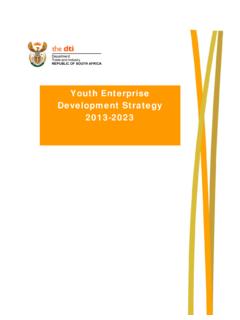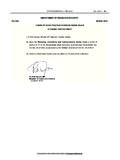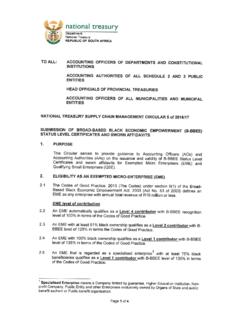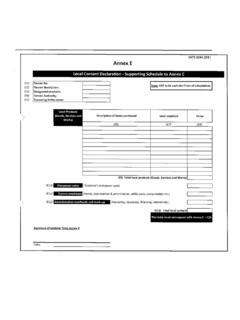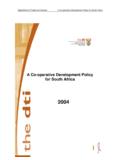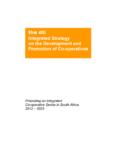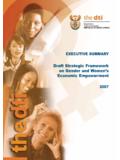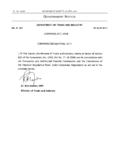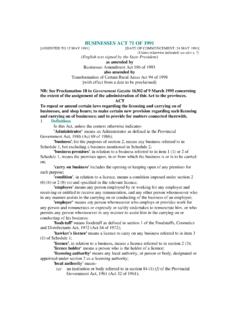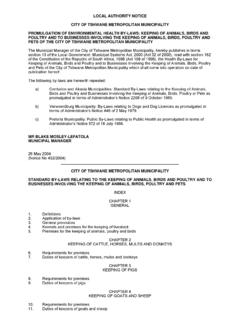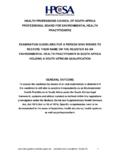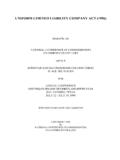Transcription of Consumer Affairs Act - dti
1 Consumer Affairs (Unfair BUSINESS PRACTICES) ACT NO. 71 OF 1988 as amended by Harmful Business Practices Amendment Act, No. 43 of 1990 Harmful Business Practices Amendment Act, No. 64 of 1991 Harmful Business Practices Amendment Act, No. 33 of 1993 Harmful Business Practices Amendment Act, No. 23 of 1999 ACT To provide for the prohibition or control of certain business practices; and for matters connected therewith. Definitions: In this Act, unless the context otherwise indicates - "arrangement" means, except in paragraph (a) of the definition of 'business practice , an arrangement or undertaking negotiated by the committee; benefit means any prize, reward, gift, service, concession, free admittance or admittance at a reduced charge to a place of entertainment, free insurance or insurance at a reduced rate, or any other benefit or advantage of any kind whatsoever; business means any business, undertaking or person who-- (a) offers, supplies, or makes available any commodity; (b) solicits or receives any investment or to whom any investment is supplied or made available.
2 Business practice includes -- (a) any agreement, accord, arrangement, understanding or undertaking, whether legally enforceable or not, between two or more persons; (b) any scheme, practice or method of trading, including any method of marketing or distribution; (c) any advertising, type of advertising or any other manner of soliciting business; (d) any act or omission on the part of any person, whether acting independently or in concert with any other person; (e) any situation arising out of the activities of any person or class or group of persons,but does not include a practice regulated by competition law; chairperson means the chairperson referred to in section 2(2); committee means the Consumer Affairs Committee established by section 2; commodity means any property, whether corporeal or incorporeal and whether movable or immovable, and also any make or brand of any commodity and any service, whether personal, professional or otherwise, including any storage, transportation, insurance or banking service, but does not include service in terms of a contract of employment; competent authority means a competent authority responsible for business practices or Consumer protection in the provincial sphere of government in terms of provincial legislation; Consumer means - (a) any natural person to whom any commodity is offered, supplied or made available; (b) any natural person from whom any investment is solicited or who supplies or makes available any investment.
3 (c) any other person who the Minister with the concurrence of the committee declares to be a Consumer by notice in the Gazette; (d) any person who is a Consumer for the purposes of this Act in terms of any other law; investigating officer means an investigating officer appointed under section 7(1); investment means any money, property or any other facility intended for utilisation in connection with any venture or scheme for the acquisition of gain or purported to be so intended; magistrate means the Magistrate: Pretoria or the magistrate of the district where the investigation is to be carried out; Minister means the Minister of Trade and Industry; regulation means a regulation made under section 16; special court means a court established under section 13(2); this Act includes any notice published or given thereunder and any regulation; trade coupon means anything whatsoever which, either by itself or in connection with any other thing or any act, entitles or purports to entitle the holder thereof to receive, or to participate in a competition for, any benefit.
4 Unfair business practice means any business practice which, directly or indirectly, has or is likely to have the effect of - (a) harming the relations between businesses and consumers; (b) unreasonably prejudicing any Consumer ; (c) deceiving any Consumer ; or (d) unfairly affecting any Consumer . 2. Business Practices Committee. (1) There is hereby established a committee to be known as the Consumer Affairs Committee. (2)(a) The committee shall consist of nine members appointed by the Minister on the grounds of having special knowledge or experience of Consumer advocacy, economics, industry, commerce or law, taking into account the need to ensure equitable representation. The Minister shall designate one as chairperson and one as vice-chairperson. (aA) The chairperson shall be a person with suitable experience in Consumer law (aB) In order to assist and to ensure effective co-operation between the committee and a competent authority, the head of Consumer Affairs in every provincial sphere of government shall be invited to, and may, participate in all meetings of the committee but shall not have the right to vote at such meetings.
5 (b) The Minister shall determine whether a member of the committee shall be a full-time or a part-time member. (3) When for any reason the chairperson is not able to perform his functions or is not available, or when there is a vacancy in the office of the chairperson, the vice chairperson shall act as chairperson. (4) The Minister may, if he sees fit, appoint, on such conditions and for such period as he may determine, a person as an additional member of the committee for a particular purpose. (5) A member of the committee - (a) shall hold office for such period, but not exceeding five years, and on such conditions as the Minister may determine at the time of his appointment; (b) who is not in the full-time service of the State, shall in connection with the activities of the committee be paid such remuneration and allowances as the Minister may determine with the concurrence of the Minister of Finance; (c) shall vacate his office if he resigns as a member or if the Minister at any time terminates his period of office as a member if in the opinion of the Minister there are sound reasons for doing so; (d) may be reappointed at the expiry of his period of office by effluxion of time.
6 (6) (a) No full-time member of the committee shall without the consent of the Minister perform work for anybody else for remuneration. (b) Any person who contravenes paragraph (a) shall be guilty of an offence. (7) (a) The chairperson (i) shall determine the times when and places at which the meetings of the committee shall be held; and (ii) may determine that a meeting other than a meeting convened for purposes of investigations under section 5, takes place through any method of telecommunication. (b) The person presiding at a meeting of the committee shall determine the procedure at the meeting. (c) The decision of a majority of the members of the committee present at a meeting thereof shall constitute the decision of the committee. (d) No proceedings of the committee shall be invalid by reason only of the fact that a vacancy existed in its membership of that a member was not present during the proceedings or any part thereof.
7 (e) The quorum for the meetings of the committee shall be-- (i) the chairperson or vice-chairperson; and (ii) four other members of the committee. (8) The administrative work arising from the performance of the committee's functions shall be performed by officers of the Department of Trade and Industry designated for that purpose by the Director-General : Trade and Industry. 3. Executive (1) The committee shall, with the consent of the Minister, appoint an executive committee, consisting of at least-- (a) the chairperson or vice-chairperson; and (b) two other members of the committee. (2) The committee, with the consent of the Minister-- (a) shall determine the quorum for and the procedure at meetings of the executive committee; (b) may delegate any power conferred or duty imposed on the committee by this Act to the executive committee, either in general or in a particular case or in cases of a particular nature.
8 (3) The executive committee must exercise any power or duty that has been delegated to it in terms of subsection (2)(b) subject to the conditions the committee considers necessary. (4) Any delegation in terms of subsection (2)(b)-- (a) must be in writing; (b) does not prevent the committee from exercising the power or performing the duty itself; (c) may at any time be withdrawn in writing by the committee. 3A. Liaison (1) (a) The chairperson may appoint one or more liaison committees, which shall advise the committee on such matters as the chairperson may determine and refer to a liaison committee for advice. (b) A liaison committee shall consist of the number of members determined by the chairperson. (2) A member of a liaison committee -- (a)shall be appointed for such period, but not exceeding three years, as the chairperson may determine at the time of his appointment; (b)who is not in the full-time service of the State, shall in connection with the activities of the liaison committee be paid such remuneration and allowances as the Minister may determine with the concurrence of the Minister of State Expenditure; (c)shall vacate his office if he resigns as a member or if the chairperson at any time terminates his period of office as a member because in the opinion of the chairperson there are sound reasons for doing so; (d)may be reappointed at the expiry of his period of office by effluxion of time.
9 (3) The chairperson and vice-chairperson of a liaison committee shall be designated by the chairperson. (4) The vice-chairperson of a liaison committee shall act as chairperson when the chairperson of the liaison c ommittee is not able to perform his functions or when he is not available, or when there is a vacancy in the office of the chairperson of the liaison committee concerned. (5) (a) The meetings of a liaison committee shall be held at auch times and places as the chairperson of the liaison committee concerned may determine. (b) The person presiding at a meeting of the liaison committee concerned shall determine the procedure at the meeting. (c) The decision of a majority of the members of a liaison committee present at a meeting thereof shall constitute the decision of that liaison committee. 4. Functions of committee.
10 (1) The committee (a) shall from time to time make known information on current policy in relation to business practices in general and unfair business practices in particular, to serve as general guidelines for persons affected thereby; (b) shall receive and dispose of representations in relation to any matter with which it may deal in terms of this Act; (bA) shall receive and dispose of particulars of the result of any investigation made by a competent authority in relation to any matter with which the committee may deal in terms of this Act; (c) may make such preliminary investigation as it may consider necessary into, or confer with any interested party in connection with, any unfair business practice which allegedly exists or may come into existence; (d) shall or may, as the case may be, perform any other function assigned to it by this Act; (e) may assign any preliminary investigation or investigation in terms of this Act, or part thereof, to a competent authority.
